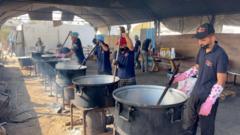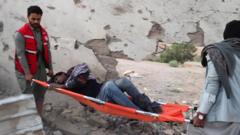Community kitchens in Gaza, integral to supporting those in need, are at risk of running out of food due to the ongoing blockade. With dwindling supplies and rising desperation, humanitarian leaders are calling for action to reopen crossings.
Gaza's Community Kitchens Face Dire Food Shortages Amid Ongoing Blockade

Gaza's Community Kitchens Face Dire Food Shortages Amid Ongoing Blockade
As the Israeli blockade stretches into its third month, community kitchens in Gaza are warning of an imminent food crisis, affecting thousands of families reliant on aid.
Article Text:
In the Gaza Strip, the desperate need for food has become increasingly evident as community kitchens warn of critical shortages amid an ongoing blockade by Israel. Based in Khan Younis, Anera's community kitchens serve approximately 6,000 people daily, offering a rare source of nourishment for families who now find it difficult to secure even basic meals.
Today’s meal, koshari—typically made of lentils, rice, and a flavorful tomato sauce—will be delivered to the most vulnerable by donkey cart. "People depend on our meals; they have no income to purchase what little remains in local markets, and many food items simply aren't available," explained Sami Matar, the Anera team leader.
The humanitarian crisis intensified two months ago, when Israel closed all crossings into Gaza, effectively barring food, fuel, and medical supplies. Subsequently, significant military action recommenced against Hamas, which Israel claims is necessary for hostage negotiations, yet the humanitarian ramifications are devastating. The UN's World Food Program and UNRWA recently announced they have depleted their food aid stocks, indicating a looming mass starvation if the blockade continues.
International pressure mounts on Israel to lift its blockade, with statements from humanitarian leaders condemning the act of starving civilians. “Aid, and the lives it saves, should never be used as a tool for negotiation,” warned UN humanitarian chief Tom Fletcher, highlighting the dire effects on medical access and basic dignity faced by Gazans.
Community kitchens, providing life-sustaining meals, are now all that's left for hundreds of thousands of Gaza residents. But Matar expressed worry that supplies are nearly exhausted; “We expect we have two weeks' worth of food, maybe less,” he cautioned, showing the empty shelves of Anera’s warehouse. Previously capable of receiving over 100 trucks of aid weekly, the organization now struggles to procure basic items like rice and cooking oil.
The situation remains dire as displaced individuals report the lack of cooking resources and essentials: “I’ve searched all day for bread,” remarked an elderly man relieved to receive food for his family of seven. As the blockade crushes livelihoods, many Gazans find themselves resorting to desperate measures to survive, turning to utility such as leaves for making fire.
Despite the alarming statistics which indicate that over 90% of the 2.1 million population has been displaced, Israel's government maintains that sufficient aid has been provided, stating that nearly 450,000 tons of goods entered Gaza during the prior ceasefire. However, the flattening of supply chains has led to depreciation of hope among the affected populace.
As community workers carefully distribute remaining meals, concerns over children's health grow, with warnings of rising malnutrition rates among the young. Matar, with a heavy heart, expressed his anxiety, urging immediate action: "Our appeal is urgent. Time is scant, and we merely want the crossings to be reopened to save lives."
In the Gaza Strip, the desperate need for food has become increasingly evident as community kitchens warn of critical shortages amid an ongoing blockade by Israel. Based in Khan Younis, Anera's community kitchens serve approximately 6,000 people daily, offering a rare source of nourishment for families who now find it difficult to secure even basic meals.
Today’s meal, koshari—typically made of lentils, rice, and a flavorful tomato sauce—will be delivered to the most vulnerable by donkey cart. "People depend on our meals; they have no income to purchase what little remains in local markets, and many food items simply aren't available," explained Sami Matar, the Anera team leader.
The humanitarian crisis intensified two months ago, when Israel closed all crossings into Gaza, effectively barring food, fuel, and medical supplies. Subsequently, significant military action recommenced against Hamas, which Israel claims is necessary for hostage negotiations, yet the humanitarian ramifications are devastating. The UN's World Food Program and UNRWA recently announced they have depleted their food aid stocks, indicating a looming mass starvation if the blockade continues.
International pressure mounts on Israel to lift its blockade, with statements from humanitarian leaders condemning the act of starving civilians. “Aid, and the lives it saves, should never be used as a tool for negotiation,” warned UN humanitarian chief Tom Fletcher, highlighting the dire effects on medical access and basic dignity faced by Gazans.
Community kitchens, providing life-sustaining meals, are now all that's left for hundreds of thousands of Gaza residents. But Matar expressed worry that supplies are nearly exhausted; “We expect we have two weeks' worth of food, maybe less,” he cautioned, showing the empty shelves of Anera’s warehouse. Previously capable of receiving over 100 trucks of aid weekly, the organization now struggles to procure basic items like rice and cooking oil.
The situation remains dire as displaced individuals report the lack of cooking resources and essentials: “I’ve searched all day for bread,” remarked an elderly man relieved to receive food for his family of seven. As the blockade crushes livelihoods, many Gazans find themselves resorting to desperate measures to survive, turning to utility such as leaves for making fire.
Despite the alarming statistics which indicate that over 90% of the 2.1 million population has been displaced, Israel's government maintains that sufficient aid has been provided, stating that nearly 450,000 tons of goods entered Gaza during the prior ceasefire. However, the flattening of supply chains has led to depreciation of hope among the affected populace.
As community workers carefully distribute remaining meals, concerns over children's health grow, with warnings of rising malnutrition rates among the young. Matar, with a heavy heart, expressed his anxiety, urging immediate action: "Our appeal is urgent. Time is scant, and we merely want the crossings to be reopened to save lives."



















